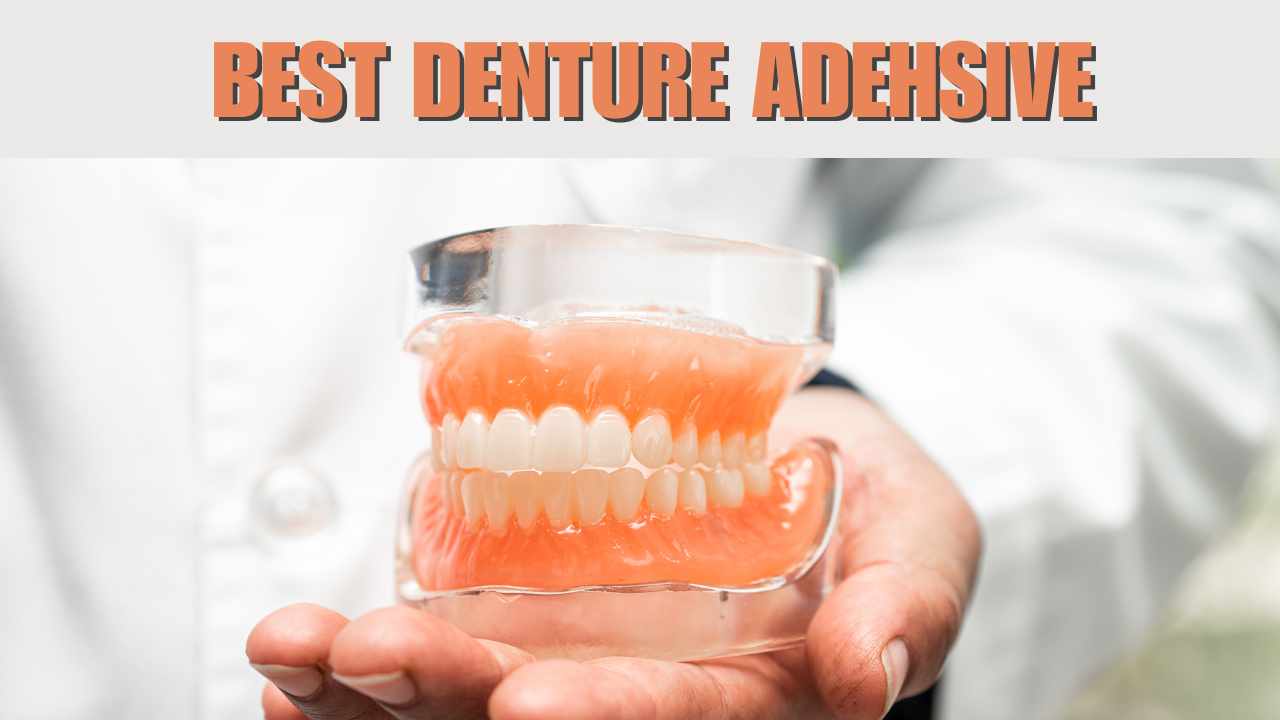Wearing dentures can restore your smile and chewing ability, but without a good adhesive, they may slip, cause discomfort, or even affect your speech. Denture adhesives help secure your dentures in place, improving confidence and overall comfort. However, with so many options available, choosing the best one can be overwhelming.
Here we will explore the best denture adhesives, their types, benefits, how to apply them properly, and expert tips for long-lasting hold.
What is Denture Adhesive?
Denture adhesive is a glue-like product that creates a strong bond between dentures and gums, preventing movement while eating or talking. It comes in various forms, such as cream, powder, strips, or pads, and provides different levels of hold and comfort.
While properly fitted dentures should stay in place without adhesive, many people find it helpful for added security and confidence.
Types of Denture Adhesives
1. Denture Adhesive Creams
This method is best for a strong, all-day hold. A small amount of cream is applied to the denture base, forming a tight seal with the gums.
Top brands:
- Fixodent Ultra Max Hold – Strong, all-day hold
- Poligrip Power Hold + Seal – Great for preventing food particles
- Cushion Grip Thermoplastic Adhesive – Provides a soft, long-lasting grip
2. Denture Adhesive Powders
Best for mess-free application and light hold. A fine powder is sprinkled onto wet dentures, creating a secure bond when moistened.
Top brands:
- Fixodent Extra Hold Powder – Stronger than standard powders
- Super Poligrip Powder – Great for all-day hold
- Effergrip Adhesive Powder – Free from zinc, safe for daily use
3. Denture Adhesive Strips and Pads
Best for easy, pre-measured application. Soft adhesive strips or pads are placed on the denture base, providing a cushioned and secure fit.
Top brands:
- Secure Adhesive Strips – Waterproof, holds dentures all-day
- Sea-Bond Secure Denture Adhesive Wafers – Pre-cut for easy use
4. Zinc-Free Denture Adhesives
Best for people with sensitivity to zinc. These adhesives avoid excess zinc, which, in large amounts, may cause health concerns.
Top brands:
- Super Poligrip Free (Zinc-Free)
- Secure Waterproof Denture Adhesive
How to Apply Denture Adhesive Properly
- Clean your dentures thoroughly with a soft brush and mild soap to remove any debris.
- Apply the adhesive sparingly in small dots or thin strips, avoiding overuse.
- Press and hold dentures firmly in place for a few seconds to secure the bond.
- Avoid eating or drinking for 15 minutes to allow the adhesive to fully set.
How to Remove Denture Adhesive
- Rinse your mouth with warm water to soften the adhesive.
- Gently remove dentures using a slight rocking motion to avoid damaging your gums.
- Clean any residue with a soft toothbrush or denture cleanser.
- Massage your gums to improve circulation and maintain gum health.
How to Choose the Best Denture Adhesive for You
- For maximum hold: Fixodent Ultra Max Hold or Secure Waterproof Adhesive
- For sensitive gums: Super Poligrip Free (Zinc-Free) or Cushion Grip
- For easy application: Sea-Bond Strips or Secure Adhesive Wafers
- For mess-free use: Fixodent Powder or Effergrip Powder
Your choice depends on personal comfort, ease of use, and how long you need your dentures to stay in place.
How Long Does Denture Adhesive Last?
Most high-quality adhesives provide eight to twelve hours of stronghold. However, factors like eating habits, saliva production, and denture fit can affect adhesive longevity.
If your dentures frequently loosen, consult your dentist for a reline or adjustment. The adhesive should not replace a well-fitting denture.
Conclusion:
A good denture adhesive provides a secure, comfortable, and mess-free experience, allowing you to eat, speak, and smile with confidence. Choosing the right type, whether cream, powder, or strips, depends on your needs and comfort preferences.
If you experience frequent denture movement, visit your dentist to check your denture fit. Adhesives should only be a temporary solution for poor-fitting dentures.
FAQs
1. What is the strongest denture adhesive?
Fixodent Ultra Max Hold and Secure Waterproof Adhesive are among the strongest options available, providing an all-day hold.
2. How often should I apply denture adhesive?
Most adhesives last for a full day. However, if your dentures frequently loosen, you may need to apply more or consult your dentist about a better fit.
3. Is zinc in adhesive harmful?
Excessive zinc intake over time may cause health issues. If you are concerned, choose a zinc-free adhesive like Super Poligrip Free.
4. Can I eat and drink with denture adhesive?
Yes, high-quality adhesives allow you to eat and drink comfortably. However, avoid very hot liquids as they can weaken the adhesive bond.
5. How do I remove denture adhesive from my gums?
Use warm water and a soft toothbrush to gently remove any adhesive residue from your gums and dentures.

